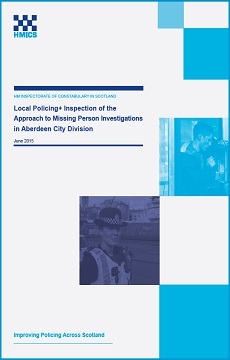The aim of this inspection was to assess the state, effectiveness and efficiency of the investigative arrangements for adults, children and young people reported missing in Police Scotland Aberdeen City Division. Whilst we have inspected the approach to investigation through the lens of local policing in Aberdeen, we have also had regard to the wider national arrangements by examination of broader strategic arrangements within Police Scotland. This includes a detailed assessment of national approaches to all aspects of the missing person investigations from initial reporting and recording, assessment of risk and investigation, through to management of the return and working with other agencies around harm reduction strategies.
This inspection comprised the + element of a wider inspection of local policing arrangements in Aberdeen conducted early in 2015 under the HMICS Local Policing + Programme. This inspection, which forms part of our published scrutiny plan, is the third in our local policing inspection programme. Our findings from the local policing inspection in Aberdeen City Division are subject of a separate report which is available on the HMICS website.
HMICS wishes to thank a number of organisations and agencies who assisted us in our missing person inspection work in Aberdeen and with our wider national assessment activity. This includes Children in Scotland, the Scottish Institute of Policing Research (SIPR) and the Care Inspectorate who worked directly with us on service user aspects of the Aberdeen element of this inspection. The collaborative work and new approach to inspection was adopted to enable us to access service users and meets our statutory duty of user involvement under Section 112 of the Public Services Reform (Scotland) Act 2010 by enabling us to secure continuous improvement in user focus in the exercise of our scrutiny function.
We also wish to thank missingpeople.org.uk and the UK Centre for the Study of Missing Persons at Portsmouth University for supporting our work through the provision of access to various research materials. Further background information on each of these organisations and agencies is included as Appendix ‘B’ to this report.
To support our main inspection some additional research was conducted with service users in Aberdeen. This work was conducted by Miranda Alcock (Children in Scotland), Amy Humphrey (Scottish Institute of Policing Research) and Callum Finlay (Care Inspectorate Young Inspector) and this supporting work is published in full on the HMICS website: Link
Number | Recommendation |
|---|---|
1 | Aberdeen City Division should share the findings from its recently developed missing person tactical assessment with community planning partners in Aberdeen and in particular child and adult protection committees. |
2 | Police Scotland should work with the Scottish Government Missing Person Steering Group to develop common partnership definitions for missing people that can be agreed and adopted by multi-agency partners across Scotland. |
3 | Police Scotland should ensure greater consistency between internal and external management information reports on missing people by drawing source data from final incident closing codes on command and control systems. |
4 | Aberdeen City Division should work with Contact, Command and Control Division to introduce processes to ensure that data and information about missing persons is properly recorded on both STORM and the CrimeFile missing person system to achieve greater accuracy and reconciliation of data between both systems. |
5 | Police Scotland should provide clearer guidance to officers on the establishment of a single point of contact for the relatives or guardians of missing people. |
6 | Aberdeen City Division should put local arrangements in place to ensure that return home interviews (in addition to safe and well checks) are conducted by investigating officers for all missing people including adults in accordance with the provisions set out in the Police Scotland Standard Operating Procedure. |
7 | Aberdeen City Division should conduct a review of the Return Home Welfare Interview (RHWI) function in light of the Police Scotland Standard Operating Procedure and new Missing Person Operational Co-ordinator post to ensure that an equitable service is available when the dedicated RHWI officer is not available due to rest days or annual leave. |
8 | Police Scotland should issue policy guidance to staff on the circumstances under which a reported missing person should result in a vulnerable person database entry. |
9 | Police Scotland should conduct a review of staffing within the National Missing Person Unit to ensure that it has sufficient capacity to administer the national long-term missing person database, conduct national investigative reviews and support the ongoing improvement agenda around missing person investigations. |
10 | Police Scotland should ensure that all divisions develop missing person tactical assessments at local authority level to share with local community planning partners including child and adult protection committees. |
11 | Police Scotland should work with local authorities and local child and adult protection committees in developing more routine analysis and sharing of data about missing people to inform shared partnership tactical assessments. |


